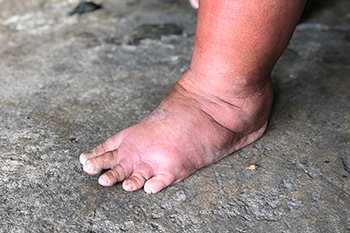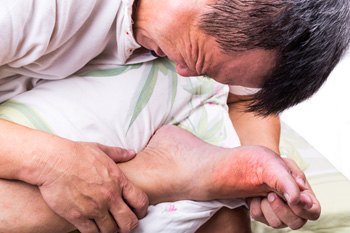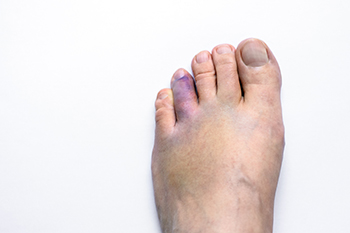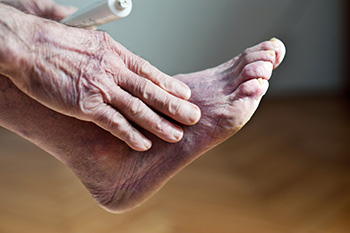Items filtered by date: October 2023
Reasons for Swollen Feet

Swollen feet can cause both inconvenience and discomfort, but ignoring them may be dangerous, as edema can be a symptom of an underlying condition. One of the most common causes of swollen feet is pregnancy, which can be the result of increased fluid retention and hormonal changes. Injuries to the leg or ankle can lead to swelling, as ligaments stretch beyond their normal range of motion. Lymphedema, another cause of swelling, results from the accumulation of lymphatic fluid, often after cancer radiation therapy or lymph node removal. Venous insufficiency, which stems from damaged vein valves in the legs and feet, can also cause the feet to swell, and can be accompanied by potential symptoms such as ulcers and skin discoloration. Infections pose a risk, especially for those with diabetic neuropathy or nerve problems, making regular foot exams with a podiatrist essential for diabetics patients. Certain medications can induce foot swelling as a side effect, necessitating consultation with a podiatrist. Arthritis can affect joints, causing swelling as a result of increased synovial fluid or inflammation. While mild foot swelling may not always warrant medical attention, chest pain, breathing difficulties, or shortness of breath require immediate evaluation as they may indicate pulmonary edema. If you notice sudden or unusual swelling in your feet, it is strongly suggested that you make an appointment with a podiatrist at your earliest opportunity.
Swollen feet can be a sign of an underlying condition. If you have any concerns, contact Michael Bess, DPM of Florida. Our podiatrist can provide the care you need to keep you pain-free and on your feet.
Swollen feet are a common ailment among pregnant women and people who stand or sit for extended periods. Aging may increase the possibility of swollen feet and patients who are obese often notice when their feet are swelling too. There may be medical reasons why swollen feet occur:
- Phlebitis - A condition that causes the veins to become inflamed and can also cause leg pain.
- Liver disease - This may lead to low blood levels of albumin which is a protein. This can cause fluid in the blood to pass into the tissues and several areas of the body can become swollen.
- Heart failure - When the heart doesn’t pump properly the blood that is normally pumped back to the heart can pool in the veins of the legs causing swollen feet.
- Kidney disease - One of the main functions of the kidneys is releasing excess fluid in the body. This type of condition can make it difficult for the kidneys to function properly, and as a result the feet may become swollen.
- Deep-vein thrombosis (DVT)- This is a serious condition where blood clots form in the veins of the legs. They can block the return of blood from the legs to the heart which may cause the feet to swell. It is important to be treated by a podiatrist if this condition is present.
Swollen feet can also be caused by bone and tendon conditions, including fractures, arthritis, and tendinitis. Additionally, there may be skin and toenail conditions and an infection may cause the feet to swell. Patients who take medicine to treat high blood pressure may be prone to getting swollen feet.
Many patients elevate their feet to help relieve the swelling and this is generally a temporary remedy. When a podiatrist is consulted the reason behind the swelling can be uncovered and subsequently treated.
If you have any questions please feel free to contact our office located in West Palm Beach, FL . We offer the newest diagnostic tools and technology to treat your foot and ankle needs.
Get Proper Care for a Sports-Related Foot or Ankle Injury This Fall
The Intricate Relationship Between Gout and Kidney Disease

Gout, a form of arthritis, and kidney disease share a complex interconnection that significantly impacts an individual's health. Gout is characterized by the accumulation of uric acid crystals in joints, causing intense pain and inflammation, commonly beginning in the big toe. This can temporarily cause the inability to walk, and medical attention from a podiatrist is often sought. Interestingly, uric acid is primarily filtered and excreted through the kidneys. In individuals with gout, high levels of uric acid can strain the kidneys, potentially leading to kidney stones or reduced kidney function. Conversely, pre-existing kidney issues can hinder the efficient elimination of uric acid, contributing to elevated levels in the bloodstream and subsequent gout attacks. Furthermore, medications commonly prescribed for gout can impact renal function, posing challenges for those already grappling with kidney disease. Understanding and managing this intricate relationship between gout and kidney disease is crucial for comprehensive treatment strategies that address both conditions and enhance overall well-being. If you have developed gout, it is strongly suggested that you are under the care of a podiatrist who can help you manage this condition.
Gout is a foot condition that requires certain treatment and care. If you are seeking treatment, contact Michael Bess, DPM from Florida. Our podiatrist will treat your foot and ankle needs.
What Is Gout?
Gout is a type of arthritis caused by a buildup of uric acid in the bloodstream. It often develops in the foot, especially the big toe area, although it can manifest in other parts of the body as well. Gout can make walking and standing very painful and is especially common in diabetics and the obese.
People typically get gout because of a poor diet. Genetic predisposition is also a factor. The children of parents who have had gout frequently have a chance of developing it themselves.
Gout can easily be identified by redness and inflammation of the big toe and the surrounding areas of the foot. Other symptoms include extreme fatigue, joint pain, and running high fevers. Sometimes corticosteroid drugs can be prescribed to treat gout, but the best way to combat this disease is to get more exercise and eat a better diet.
If you have any questions please feel free to contact our office located in West Palm Beach, FL . We offer the newest diagnostic and treatment technologies for all your foot and ankle needs.
Common Foot Injuries Sustained in Falls

Foot injuries resulting from slip and fall accidents are often underestimated but can have long-lasting consequences. Common foot injuries in falls may include strained and sprained ankles, broken ankles requiring surgery, or torn Achilles tendons. Additionally, complex Lisfranc fractures, dislocated toes, crush injuries, and lacerations can occur from falling. While casts, braces, and rehabilitation may help, these injuries can lead to chronic pain, loss of mobility, and other complications in the future. Over time, bone spurs may develop, damaged cartilage may degrade further, and stretched tendons may weaken, causing pain and mobility issues in other areas of the body. If you have sustained an injury to your feet or ankles due to a fall, it is suggested that you make an appointment with a podiatrist.
Preventing falls among the elderly is very important. If you are older and have fallen or fear that you are prone to falling, consult with Michael Bess, DPM from Florida. Our podiatrist will assess your condition and provide you with quality advice and care.
Every 11 seconds, an elderly American is being treated in an emergency room for a fall related injury. Falls are the leading cause of head and hip injuries for those 65 and older. Due to decreases in strength, balance, senses, and lack of awareness, elderly persons are very susceptible to falling. Thankfully, there are a number of things older persons can do to prevent falls.
How to Prevent Falls
Some effective methods that older persons can do to prevent falls include:
- Enrolling in strength and balance exercise program to increase balance and strength
- Periodically having your sight and hearing checked
- Discuss any medications you have with a doctor to see if it increases the risk of falling
- Clearing the house of falling hazards and installing devices like grab bars and railings
- Utilizing a walker or cane
- Wearing shoes that provide good support and cushioning
- Talking to family members about falling and increasing awareness
Falling can be a traumatic and embarrassing experience for elderly persons; this can make them less willing to leave the house, and less willing to talk to someone about their fears of falling. Doing such things, however, will increase the likelihood of tripping or losing one’s balance. Knowing the causes of falling and how to prevent them is the best way to mitigate the risk of serious injury.
If you have any questions, please feel free to contact our office located in West Palm Beach, FL . We offer the newest diagnostic and treatment technologies for all your foot care needs.
Psychological Impact of a Broken Toe on Athletes

Besides the physical impact of broken toes, they can take a profound psychological toll on athletes because they rely heavily on their feet for mobility. While many dismiss a broken toe as a minor inconvenience, for athletes, it can signify missing crucial games, falling behind in training, or even questioning the longevity of their career. It is a medical setback that should be tended to by a podiatrist and requires coping mechanisms such as mindfulness and visualization. If you are an athlete who has broken your toe, it is suggested that you make an appointment with a podiatrist for treatment and support for your overall well-being.
Broken toes may cause a lot of pain and should be treated as soon as possible. If you have any concerns about your feet, contact Michael Bess, DPM from Florida. Our podiatrist will treat your foot and ankle needs.
What Is a Broken Toe?
A broken toe occurs when one or more of the toe bones of the foot are broken after an injury. Injuries such as stubbing your toe or dropping a heavy object on it may cause a toe fracture.
Symptoms of a Broken Toe
- Swelling
- Pain (with/without wearing shoes)
- Stiffness
- Nail Injury
Although the injured toe should be monitored daily, it is especially important to have a podiatrist look at your toe if you have severe symptoms. Some of these symptoms include worsening or new pain that is not relieved with medication, sores, redness, or open wounds near the toe.
If you have any questions, please feel free to contact our office located in West Palm Beach, FL . We offer the newest diagnostic and treatment technologies for all your foot care needs.
Tips to Improve Blood Flow in the Feet

Proper circulation is essential for overall health, and when it comes to your feet, it is no different. Poor circulation in the feet can lead to coldness and a numbing and tingling sensation. Fortunately, there are several strategies that can enhance blood flow to your feet. It is important to understand that engaging in a regular exercise routine is a game changer. Activities such as walking, swimming, and yoga can get your blood pumping and improve circulation. Foot exercises, such as toe taps and ankle rotations, can be particularly beneficial. Maintaining a healthy weight is crucial, as excess body fat can impede blood flow. A balanced diet rich in fruits, vegetables, and whole grains can aid in weight management and overall circulation. Elevating your feet whenever possible, especially after a long day, may help to reduce swelling and can encourage blood flow back to your heart. Wearing proper footwear is essential. Choose comfortable, well-fitting shoes that provide support and do not constrict blood vessels. Additionally, it is beneficial to avoid smoking and limit caffeine intake, as these can contribute to poor circulation. Finally, stay hydrated and manage stress, as they both negatively impact circulation. If you have poor circulation, it is suggested that you speak with a podiatrist who can provide you with additional relief tips.
Poor circulation is a serious condition and needs immediate medical attention. If you have any concerns with poor circulation in your feet contact Michael Bess, DPM of Florida. Our podiatrist will treat your foot and ankle needs.
Poor Circulation in the Feet
Poor blood circulation in the feet and legs is can be caused by peripheral artery disease (PAD), which is the result of a buildup of plaque in the arteries.
Plaque buildup or atherosclerosis results from excess calcium and cholesterol in the bloodstream. This can restrict the amount of blood which can flow through the arteries. Poor blood circulation in the feet and legs are sometimes caused by inflammation in the blood vessels, known as vasculitis.
Causes
Lack of oxygen and oxygen from poor blood circulation restricts muscle growth and development. It can also cause:
- Muscle pain, stiffness, or weakness
- Numbness or cramping in the legs
- Skin discoloration
- Slower nail & hair growth
- Erectile dysfunction
Those who have diabetes or smoke are at greatest risk for poor circulation, as are those who are over 50. If you have poor circulation in the feet and legs it may be caused by PAD and is important to make changes to your lifestyle in order to reduce risk of getting a heart attack or stroke. Exercise and maintaining a healthy lifestyle will dramatically improve conditions.
As always, see a podiatrist as he or she will assist in finding a regimen that suits you. A podiatrist can also prescribe you any needed medication.
If you have any questions please feel free to contact our office located in West Palm Beach, FL . We offer the newest diagnostic and treatment technologies for all your foot and ankle needs.

